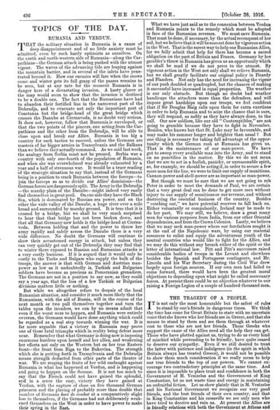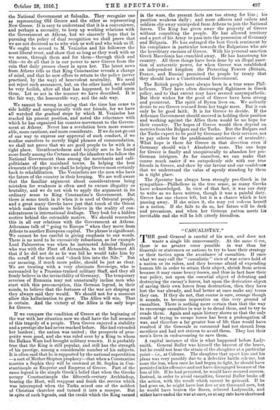THE TRAGEDY OF A PEOPLE.
IT is not only the most honourable but the safest of rules to stand by one's friends in dangerous times. We think the time has come for Great Britain to state with no uncertain voice that she knows who her friends are in Greece, and that she means to stand by them and see them through at whatever cost to those who are not her friends. Those Greeks who support the cause of the Allies need all the help they can get. Those who have plotted against us, trying to do us every kind of mischief while pretending to be friendly, have quite ceased to deserve our sympathy. Even if we still desired to treat the latter with patience and indulgence (in the spirit in which Britain always has treated Greece), it would not be possible to show them much consideration if we really mean to help our true friends to the top of our powers. We cannot en- courage two contradictory principles at the same time. And since it is impossible to place trust and confidence in both the Government of M. Venizelos and the Government of King Constantine, let us not waste time and energy in maintaining an unfruitful fiction. Let us show plainly that in M. Venizelos and his National Government we recognize our very good friends, and the best friends of their own country, and that in King Constantine and his camarilla we see only men who have tried to deceive and ruin us. At present the Allies are in friendly relations with both the Government at Athens and the National Government at Salonika. They recognize one as representing Old Greece and the other as representing New Greece. It is easy to understand that it is a convenience, and perhaps a necessity, to keep up working relations with the Government at Athens, but we sincerely hope that in pursuing the policy of dual recognition we shall prove that we are not deceived as to who wish us well and who wish us ill. We ought to accord to M. Venizelos and his followers the most liberal trust, and show that so long as they work with us we mean, through them and for them—through thick and thin—to do all that is in our power to save Greece from the ruin that daily presses closer in upon her. The latest news from Athens tells us that King Constantine reveals a change of mind, and that he now offers to return to the policy (never practised, by the way) of benevolent neutrality. We need not reject such assurances, but, on the other hand, we should be very foolish, after all that has happened, to build upon them. Let us act in the manner we have described. It is the fair way, the honourable way, and the safe way.
We cannot be wrong in saying that the time has come to side boldly and unequivocally with our friends, for we have all watched the gradual steps by which M. Venizelos has reached his present position, and noted the reluctance with which he has organized his counter-movement to the Govern- ment at Athens. Never has a revolution been more reason- able, more cautious, and more considerate. If we do not go out of our way to express our approval of such conduct, if we confine ourselves to merely frigid phrases of commendation, we shall not prove that we are good people to be with in a tight place. Greatheartedness and loyalty are to be found more freely among the Cretans and the islanders who follow the National Government than among the merchants and café- politicians of the mainland towns. In helping the best elements of the people we shall be helping Greece most certainly back to rehabilitation. The Venizelists are the men who have the future of the country in their keeping. We are well aware that the familiar argument about considerateness being mistaken for weakness is often used to excuse illegality or brutality, and we do not wish to apply the argument in its ordinary sense to King Constantine's Government. But there is some truth in it when it is used of Oriental people, and a great many Greeks have just that touch of the Orient which makes them unable to believe in the reality of con- siderateness in international dealings. They look for a hidden motive behind the ostensible motive. We should remember this in all our relations with the Government at Athens. Athenians talk of " going to Europe " when they move from Athens to another European capital. The phrase is significant. We cannot be too careful in giving emphasis to our words. There is no need to be excessively robustious, as for example Lord Palmerston was when he instructed Admiral Napier, who was with the Fleet off Alexandria, to tell Mehemet All that if he did not do as he was bid he would take him by the scruff of the neck and "chuck him into the Nile." But our meaning, if much more polite, should be just as clear. We are treating with a very obstinate Sovereign, who is surrounded by a Prussian-trained military Staff, and they all firmly believe in the invincibility of Germany. The temporary reverses of Rumania may not unnaturally incline men who start with this preconception, this German legend, in their minds, to believe that the fortunes of the war are shaping as they always said they would. We should not for a moment allow this hallucination to grow. The Allies will win. That is certain. And the victory of the Allies is the only hope for Greece.
If we compare the condition of Greece at the beginning of the war with her situation now we shall have the full measure of this tragedy of a people. Then Greece enjoyed a stability and a prestige she had never reached before. She had extended her borders ; the nation was united ; the prospects of pros- perity were good, and she was ruled over by a King to whom the Balkan Wars had brought military renown. It is probably true that the King is still popular, and still has the strength of his prestige, among a considerable number of his subjects. It is often said that he is supported by the national superstition —a sort of Mother Shipton prophecy—that when a Constantine marries a Sophia they will be crowned at St. Sophia in Con- stantinople as Emperor and Empress of Greece. Part of the same legend is the simple Greek's belief that when the Greeks occupy Constantinople the fifteenth-century Archbishop, bearing the Host, will reappear and finish the service which was interrupted when the Turks seized one of the noblest of Christian churches and turned- it into a mosque. But in spite of such legends, and the credit which the King earned in the wars, the present facts are too strong for him ; his position weakens daily ; and more officers and sailors and soldiers slip away unimpeded from Athens to join the National forces. The King has given away the property of Greece without consulting the people. He has allowed territory and a part of his Army to pass into the possession of Germany and Bulgaria. He has outraged the best Greek sentiment by his compliance in particular towards the Bulgarians who are the hereditary enemies of Greece. With his personal sanction Greek Macedonia has crumbled away. He has hamstrung his country. All these things have been done by an illegal asser- tion of autocratic power, for when Greece was established an independent kingdom the Protecting Powers (Britain, France, and Russia) promised the people by treaty that they should have a Constitutional Government.
The British people have always been in a true sense Phil- hellenes. They have often discouraged flightiness in Greek policy, and to that extent may have seemed unsympathetic. But their wishes for the good of Greece have been strong and persistent. The spirit of Byron lives on. We ardently desire to see Greece rescued from her tragic mess. But it can only be by good faith. It is for Greece to decide. If the Athenian Government should succeed in holding their position and working against the Allies there would be no hope for their country. The hopes of Greece would then depend on mercies from the Bulgars and the Turks. But the Bulgars and the Turks expect to be paid by Germany for their services, not to pay others for the problematic assistance of neutrality. What hope is there for Greece in that direction even if Germany should win ? Absolutely none. The one hope for Greece is finally and unequivocally to abandon her pro- German intrigues. As for ourselves, we can make that course much easier if we outspokenly side with our true friends in Greece, and show by our favour and our confidence that we understand the value of openly standing by them in a tight place.
The Spectator has always been strongly pro-Greek in its sympathies—Philhellene in the true sense, as many Greeks have acknowledged. In view of that fact, it was our duty to write as we have written, though it was a painful duty. Greece has one chance left, but it is a chance which is fast passing away. If she seizes it, she may yet redeem herself as a nation. If she fails to do so, her future will be dark and precarious, and when her German patron meets his inevitable end she will be left utterly friendless.



































 Previous page
Previous page